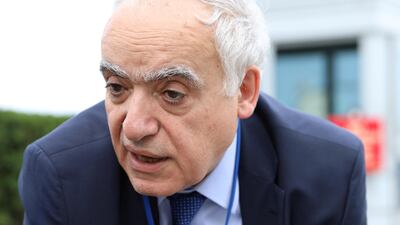Libya can often seem like a casualty of the international community’s predilection for reductionism. Even those with the best of intentions tend to approach it as if it were a coliseum of warring factions and intractable conflict, not a country of ordinary human beings with yearnings for peace and stability that are not dissimilar from those of citizens in other nations. Those who want to help Libya in earnest would profit by listening to Ghassan Salame, the distinguished Lebanese diplomat who has been head of the United Nations Support Mission in Libya since June.
Speaking to The National from the UN headquarters in New York, Mr Salame demystified Libya for outsiders. Having "crisscrossed Libya, listened to hundreds in the political class, and to average Libyans", including university students all around the country, Mr Salame wants the world to know that "Libyans have an idea of … where they want to go". But the Libyan Political Agreement – the UN-led initiative that has been the source of the interim government's legitimacy – is a stumbling block. The LPA's current structure, Mr Salame emphasised, is restrictive and, on the question of separation of powers, vague. The result is that the responsibility for Libya's governance is vested in an unwieldy presidential council, not a cabinet, inhibiting the creation of vital institutions.
_______________
Read more
UN Envoy Ghassan Salame: Time is not on side of a unified Libya
The long road to peace and reconciliation in Libya
The world cannot afford not to have a UN
_______________
It is hardly surprising that Libyans are angry. They inhabit, as Mr Salame put it, “a surrealistic situation”: a country that produces a million barrels of oil a day yet cannot deliver on health, education and social services. How to assuage the growing anger in Libya? Mr Salame’s answer is to create a “public authority” that answers to Libyans’ needs by expanding participation in the processes of governance. He will be nudging the Libyans to amend the LPA, as part of his broader transition plan, at a meeting in Tunis this week. If the popularity of the state depends on how efficiently it delivers services, its legitimacy depends on how open it is to the people it governs.
A functional and legitimate state can only come about when Libyans feel they have "ownership of the process". Formidable challenges lie ahead for Mr Salame. An end to bloodshed and violence is essential for the transition. The political class, Mr Salame acknowledges, will not submit to proposals that may disempower them. Despite gains in Sirte and Benghazi, the prospect of Libya's becoming a haven for extremists from Iraq and Syria is real. The absence of a single political authority also means that people smugglers who have turned Libya into a conduit to Europe cannot effectively be dealt with. But the UN has created an avenue for Libyans to spar in peace, and they are making use of it to achieve reconciliation. A stable Libya will take years to build, but the work being carried out by Mr Salame to get it there is a reminder, if any were needed, of the indispensability of the UN to the world.
Follow The National's Opinion section on Twitter

